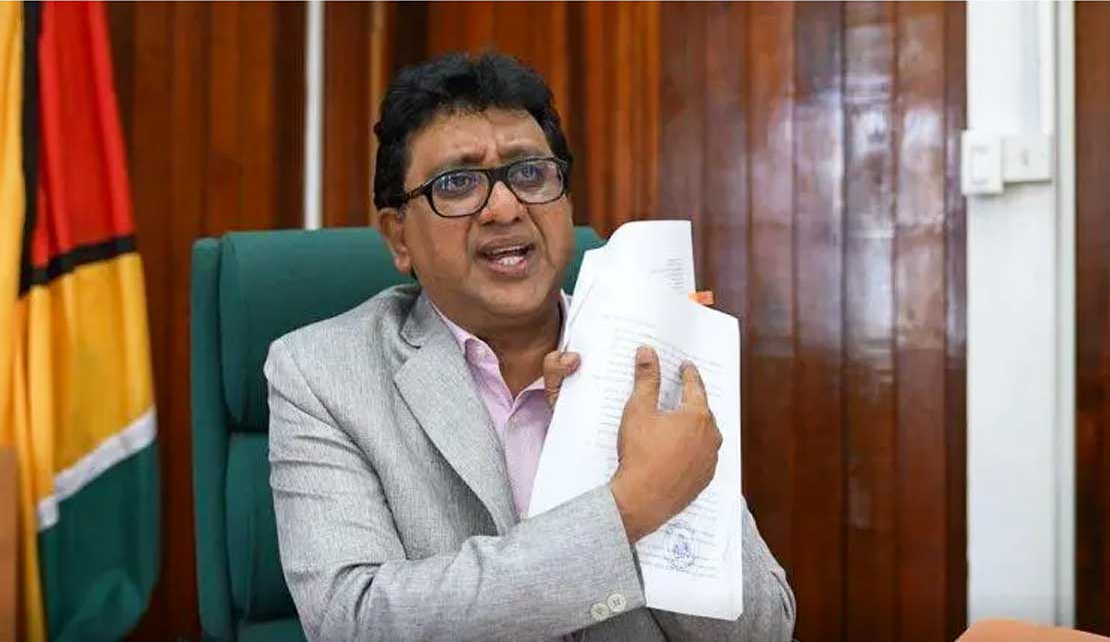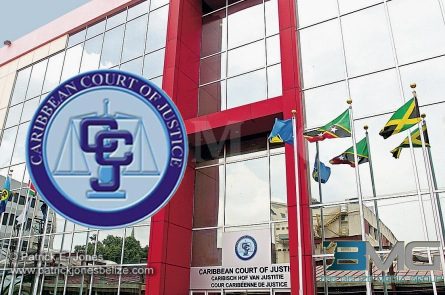Oil Spill Insurance: CCJ allows PPP Gov’t to join Exxon’s case against People Of Guyana

GEORGETOWN, Guyana, May 16, 2024 - One year after Justice Sandil Kissoon’s ruling that Exxon must have full liability insurance coverage to cover any oil spill in Guyana’s waters, the Caribbean Court of Justice (CCJ) ordered that the Guyana’s Attorney General to be added as a party to the Appeal which is still pending in the Court of Appeal.
The case was heard before CCJ Judges Justice A Saunders, President, Justice W Anderson and Mme Justice Maureen Rajnauth-Lee, who on Tuesday, May 14, 2024, ruled the Government could join Exxon’s appeal against the People of Guyana.

The case was brought by Guyanese citizens Godfrey Whyte and Frederick Collins against the Environmental Protection Agency (EPA).
In his ruling Justice Kissoon said the laxity of EPA’s “enforcement and condonation compounded by a lack of vigilance” was putting Guyana and its people “in grave potential danger of calamitous disaster.”
Kissoon’s ruling, which was seen as a victory for Guyana, was appealed by Exxon ad the government seeks to join Exxon in the case.
The Government subsequently approached the court on May 12, 2023 to join Exxon in appealing a ruling, which citizens and environmentalists saw as a safeguard to protect the ecosystem, including the people’s wellbeing.
This was denied on December 19, 2023. On January 31, 2024, the Government moved to the CCJ to appeal the Court of Appeal’s decision.
On February 7, 2024 an oil tanker, reportedly heading to Guyana, sank off the shore of Tobago. The oil spread to other Caribbean islands, reaching as far as Bonaire, destroying marine life, plant and the economic well-being of persons in its wake.
Two weeks ago the Trinidad and Tobago government estimated it will cost the twin island republic US$20 million to clean-up the damage.
The country reached out for international support. It is a similar scenario to Tobago's tragedy Whyte and Collins are hoping to mitigate.
But on February 29, 2024 the Government, through the Attorney General (AG) and Legal Affairs Minister Anil Nandlall S.C, M.P, secretly filed its case with the CCJ.
This information was made public in April, after the AG was instructed by the CCJ to file and serve written submissions and a list of authorities on or before 11 March 2024.
The EPA and citizens Godfrey Whyte and Frederick Collins, along with ExxonMobil Guyana Limited were the named respondents in the matter that was heard before CCJ.
Many Guyanese reacted in shock to the ruling. Some have contended this is more a moral than legal issue, and Government has a moral obligation to stand with the people on a matter of this nature.
One such person told Village Voice News, even if Exxon wanted to appeal the decision, which is their right to do, the Government should have stayed clear from involvement. “The government has two moral options: 1) one to join with the people or stay neutral, neither of which it chose” the commentator pointed out.
During his weekly programme, ‘Issues in the News’ on Tuesday evening, the AG Nadlall explained that “after hearing submissions from all parties on the 13 May, 2024, not surprisingly, the CCJ reversed and overruled the decision of the Court of Appeal by allowing the Appeal and ordering the Attorney General to be added as a party to the Appeal which is still pending in the Court of Appeal.”
According to the written ruling of the CCJ, it has been ordered that the Appellant be added as a party to Civil the Appeal No. 67 of 2023.
The Nandlall argued that since the Government of Guyana is a party to the 2016 Production Sharing Agreement (PSA) with ExxonMobil, the operator of Guyana’s Stabroek Block, the State should have been added to the appeal.
“We also explained in great detail that the Attorney General represents the public good and the public’s interest. This is one of the most important contracts ever executed in the history of this country to which the government is a party and from which the government is getting hundreds of millions of dollars annually which the government is using to finance its budget and to execute transformational projects for the benefit of the citizens of this country and that the Attorney General protects the public’s interest in law,” Nandlall posited following the ruling.
He pointed out that the government will now apply to the Appeal Court to be added to the matter.
O the other hand, As more oil discoveries are made off the coast of Guyana there are concerns over the increasing possibility of oil spills in the area, and the need for an unlimited guarantee agreement by ExxonMobil in the event of such an occurrence, which could do serious damage to the ecology of Guyana and possibly the wider Caribbean.
The matter of an unlimited guaranteed coverage by ExxonMobil becomes important to ensure that in the event of a disaster, there are sufficient funds available to perform a cleanup of the affected area as well as all attendant considerations.
The Environmental Protection Agency (EPA) has informed that it is currently engaging Esso Exploration and Production Guyana Limited (EEPGL) on a proposed total guarantee of US$2-billion to complement the US$600 million insurance policies for Liza 1, Liza 2 and Payara permits.
Former Head of the EPA, Dr. Vincent Adams, has warned that should ExxonMobil be allowed to renege on signing an unlimited guarantee agreement, Guyana could be left to pay billions, should an oil spill occur.
In making a case for full coverage, he pointed to the cost of the Macondo spill in the Gulf of Mexico exceeded $70 Billion USD.
“This means that the EPA is accepting that if there occurs a Macondo size spill, Guyana would be left holding the bag to cover the remaining $68 Billion which is about 34 times our entire national budget, not to mention the long-lasting devastation and even bankruptcies of economies throughout the Caribbean. Even a spill as little as one-tenth the size of the Macondo, would cost three times the total $2.6 Billion Exxon’s coverage that the EPA is so giddy about, and over three times Guyana’s entire national budget,” Dr. Adams explained.
-30-
